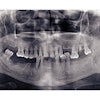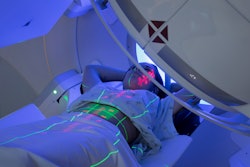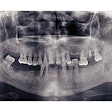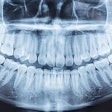Medicare recipients with head and neck cancer commonly do not complete radiation therapy without interruptions or at all, according to a report in the September issue of the Archives of Otolaryngology -- Head & Neck Surgery (Vol. 135:9, pp. 860-867).
Patients who have surgery before radiation treatment appear more likely to complete therapy, whereas those who have other illnesses or have chemotherapy first may be more likely to experience interruptions or discontinuation in radiation treatment.
"Radiotherapy [radiation therapy] alone or as an adjuvant to surgery and/or chemotherapy has been shown to be curative in patients with local or regional head and neck cancers," the authors wrote. "Clinical evidence suggests that the radiation dose and duration of treatment is correlated with tumor control and survival. Breaks in radiotherapy have been associated with inferior tumor control in the larynx, pharynx, and oral cavity."
Megan Dann Fesinmeyer, Ph.D., M.P.H., of the Fred Hutchinson Cancer Research Center in Seattle, and colleagues used cancer registries linked to Medicare data to identify 5,086 patients diagnosed with head and neck cancer between 1997 and 2003. They then calculated the timing and duration of radiotherapy using Medicare claims data, and performed analyses to estimate the association between tumor and clinical characteristics and any interruptions or discontinuation of therapy.
A substantial percentage of patients (39.8%) had interruptions in radiation therapy or failed to complete the course of therapy. Patients who had surgery at any tumor site were more likely to complete radiotherapy with no interruptions (70.4%, versus 52% of those who did not have surgery). However, patients with co-occurring illnesses, those who underwent chemotherapy, and those whose disease had spread to surrounding lymph nodes were less likely to do so.
"Surgical patients may be more likely to complete radiotherapy for several reasons. First, characteristics that make patients good candidates for surgery may also make them more likely to complete radiotherapy. Because comorbidities are known to decrease survival in patients with head and neck cancer, healthier patients may be chosen by surgeons to complete more rigorous treatments (e.g., surgery in addition to radiotherapy)," the authors write. "In addition, patients who are willing to undergo major surgery to treat their disease may also be more motivated to complete a full course of uninterrupted radiation therapy, despite any toxic effects of treatment that may occur."
Further research is needed to understand the factors associated with interruptions or failure to complete radiation therapy among patients who do not have surgery, the authors concluded.
Copyright © 2009 DrBicuspid.com


















